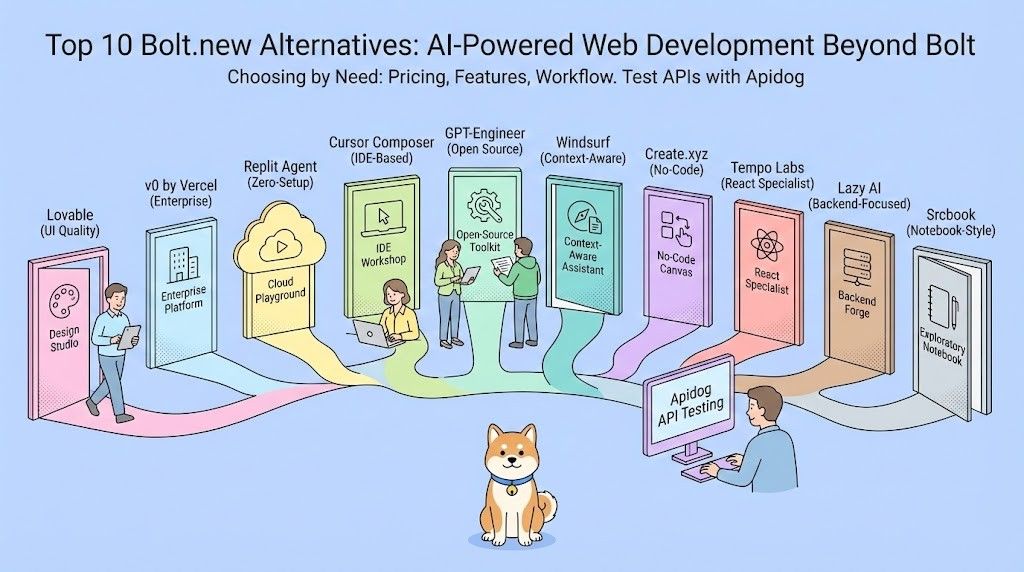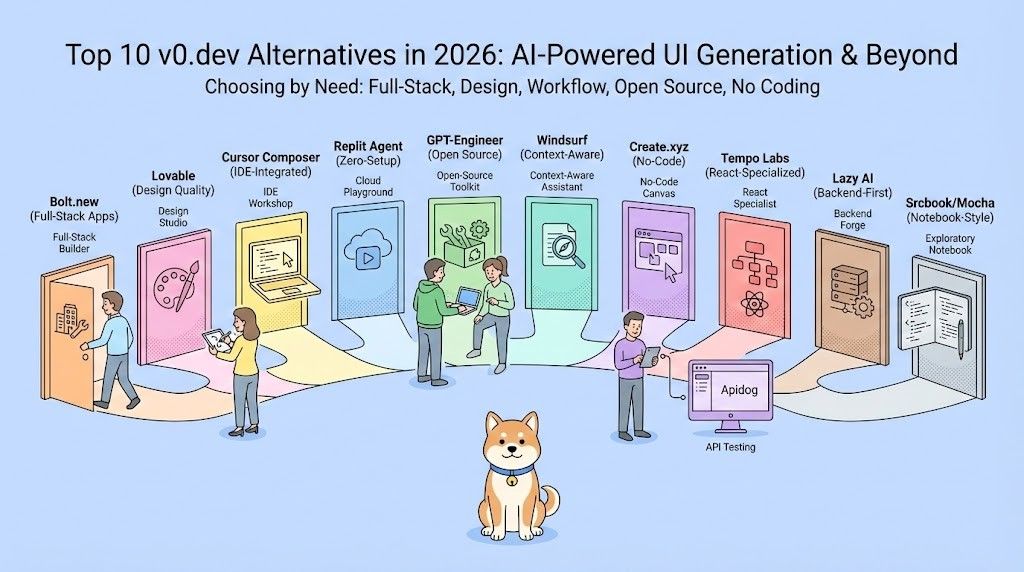Vercel v0 is an innovative tool designed to streamline the UI development process by leveraging generative AI. With Vercel v0, developers can create stunning user interfaces quickly and efficiently, using simple natural language descriptions or design mockups. This tool is built to simplify and accelerate the way UIs are developed, making it accessible even to those with limited coding experience.

How Vercel v0 Works
Vercel v0 operates as an AI-powered assistant that transforms your UI ideas into ready-to-use code. Whether you’re building a landing page, a complex web application, or a simple component, Vercel v0 can generate multiple code variations based on your input. Here’s how it works:
Step 1: Describe Your UI or Upload a Mockup
To get started, you can either describe your UI vision in plain English or upload a mockup or sketch of your desired layout. For example, you might write, "Build this homepage landing for mobile." Alternatively, you could upload a design mockup that reflects your concept. Vercel v0 will then use this information to understand your requirements.

Step 2: Generate Multiple UI Options
Once you’ve provided your description or mockup, Vercel v0’s AI engine gets to work. It generates several UI options, each with distinct styles and layouts. Think of it as having a virtual design assistant who presents you with multiple prototypes based on your vision. For example, if you’re working on a hero section, Vercel v0 might produce three variations, each with unique typography, color schemes, and component arrangements.

Step 3: Edit and Customize
After reviewing the generated options, you can select the components that best fit your project. Vercel v0 allows you to customize any aspect of the generated code. You can adjust styles, modify layouts, and even add custom functionality to ensure the UI aligns perfectly with your vision. This flexibility is key to creating a polished, professional-looking interface.

Step 4: Integrate and Develop
Once you’re satisfied with the UI, integrating the code into your project is straightforward. By clicking the Code </> button, you can access the generated code, which can then be copied and pasted directly into your codebase. This seamless transition from concept to code reduces development time and ensures that the UI is ready for deployment with minimal effort.

Getting Started with Vercel v0
Using Vercel v0 is simple and user-friendly, making it accessible to developers of all levels. Here’s a step-by-step guide to getting started:
Set Up Your Vercel Account
If you don’t already have a Vercel account, you can easily create one by visiting the Vercel website. Vercel v0 operates on a subscription-based billing model, separate from Vercel’s standard team accounts. Depending on your needs, you can choose from various subscription tiers:
- Free Plan ($0): Offers 200 credits per month, ideal for getting acquainted with Vercel v0.
- Premium Plan ($20/month): Provides 5,000 credits per month, suitable for freelancers and small teams.
- Enterprise Plan (Custom): Tailored for larger teams, with customizable credits and access to advanced features.

If you exceed your plan’s credit limit, you can purchase additional credits as needed.
Navigate to Vercel v0 and Describe Your First UI Element
Once logged into your Vercel account, navigate to the v0 section within the platform. The interface is intuitive, guiding you through the process of creating your first UI. Start by describing a simple UI element or uploading a mockup. The more specific you are in your description, the better Vercel v0 will understand your vision and generate accurate results.
Experiment with Variations
Vercel v0 will provide multiple code variations based on your input. This allows you to experiment with different styles and layouts, mixing and matching elements to create the perfect UI. While the AI-generated code is high-quality, you retain full control, ensuring that the final product meets your project’s unique requirements.
Integrate the Generated Code
After customizing your UI, you can easily integrate the generated code into your project. Simply copy the code and paste it into your component library or framework-specific files. Be sure to integrate the components according to your project’s architecture to optimize performance and functionality.
Practical Tips and Best Practices for Using Vercel v0
To make the most of Vercel v0, consider these practical tips:
- Start Simple: Begin with basic UI elements to familiarize yourself with how Vercel v0 works. As you become more comfortable, you can tackle more complex designs.
- Be Specific: Provide clear and detailed descriptions of the UI you want to create. The more specific you are, the better Vercel v0 will be able to deliver accurate results.
- Explore Pre-Built Samples: Use the Explore page in Vercel v0 to browse pre-built web app samples. These examples can serve as inspiration and help you understand the tool’s capabilities.
- Engage with the Community: Join the Vercel community to share tips, ask questions, and learn from other developers’ experiences.

Vercel v0 Use Cases and Limitations
Vercel v0 is versatile and can be applied in various development scenarios, making it an invaluable tool for modern web applications, ecommerce sites, and marketing landing pages. Here are some specific use cases:
- Rapid Prototyping: Quickly prototype different design ideas, allowing for faster iterations and more experimentation without the time-consuming process of manual coding.
- A/B Testing: Create multiple versions of a landing page for A/B testing, helping you determine which design performs best.
- Performance Analysis: Vercel v0 prioritizes performance by providing tools to analyze the generated code and identify potential bottlenecks.
- Personalization and Interactivity: Generate variations for different color themes, user settings, or interactive elements that enhance user experience.
While Vercel v0 offers significant advantages, it does have some limitations:
- Advanced Functionality: For complex interactions that require intricate logic or real-time updates, Vercel v0’s AI-generated code may need additional refinement by human developers.
- Customization Needs: While customization is possible, it can be time-consuming to refine the generated code to meet specific requirements or integrate with existing systems.
- Accessibility Considerations: AI-generated outputs may not fully address all accessibility standards, so manual checks and adjustments may be necessary to ensure compliance.
Conclusion
Vercel v0 is a powerful tool that revolutionizes UI development by combining AI with human creativity. Its ability to generate high-quality code from simple descriptions or mockups can significantly speed up your development workflow, making it easier to create polished, functional, and visually appealing user interfaces. While there are some limitations, particularly when it comes to complex interactions and accessibility, Vercel v0 is an excellent starting point for rapidly prototyping and building modern web applications. As AI technology continues to advance, tools like Vercel v0 will play an increasingly important role in the future of web development.
Using Apidog with Vercel v0
Apidog is a comprehensive API management tool that seamlessly integrates with Vercel v0, enhancing your development workflow. With Apidog, you can easily design, mock, and test APIs within your Vercel v0 environment, ensuring that your frontend and backend work harmoniously together. Apidog allows you to:
- Design APIs: Create and visualize API structures directly within Apidog, ensuring that they align with your UI components generated by Vercel v0.
- Mock API Responses: Generate mock API responses to simulate real-world scenarios, allowing you to test your UIs before the backend is fully developed.
- Test API Endpoints: Run automated tests on your API endpoints to ensure they function as expected, reducing the chances of bugs in your final product.

By integrating Apidog with Vercel v0, you can streamline both your UI and API development processes, leading to faster, more efficient project completion.



